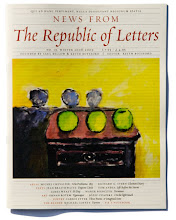You know what a globe is, a round thing often with pictures of countries, empires and waste spaces on it, a theater (Shakespeare's), and lately as common a word (nearly) as f**k. Janet Daley, the London Telegraph columnist and public scold, had this to say about it in relation to the Copenhagen codswollop. There, she said, when uttered by such as Gordon Brown, the very bright but over-ventilating UK prime minister, the word 'global' meant 'it's not my fault.' She went on to point out that the terrible word, 'bandied about with such ponderous self-importance' -- I ask, what else are politicians, if not self-important? Who else would consider them important? -- had 'political ramifications' and just saying 'global' was assumed 'to sweep away any consideration of what was once assumed to be the most basic principle of modern democracy: that elected national governments are responsible to their own people -- that the right to govern derives from the consent of the electorate.' With her piece came a picture reveatory of the new era of the non-smokey back room in which our 'leaders' reshuffle the pack and run our affairs for us. There were: a definitely utilitarian bunch of chairs, the remains of sandwiches, many empty glasses and a select tutti-frutti of our global bosses -- the ever thoughtful-looking Mr. Obama, the figure-racked head of Gordon Brown, a dumpy, gesturing Angela Merkel, a head-down-in-his-collar Nicolas Sarkozy, various flunkies (I thought I recognized the the worried brow of the ineffable Richard Holbrooke -- he who brought on the Great Balkan Crisis) and one or two insignficant 'other' leaders from who cares where. They were the important people, not us. And they looked world-weary.
I have views about 'global', and they start with a fundamental doubt: is anything really global? Is Ham?
Best always to start thinking with simple, homely things, right? Like ham. Is San Daniele a Jamon serrano? No. Is grana also reggiano? How's the parmesan in Botswana? If in the Tonkin Delta or Sarawak, les jeunes filles en fleur, the flowering maidens can marry at twelve or before, but not in Connecticut, and if homosexuals can marry each other in dear old Massachusetts but face the death penalty in Uganda, are our customs global? Should they be? The word 'discrimination' once implied a form of connoisseurship: you could tell a Hals from a daub. Well, I have an old-fashioned belief that nothing I give a good damn about is even remotely global. On the contrary. It is so local, so rooted in custom, tradition and individual taste that there are producers of some hams that are better than others, and to me 'global' means Kraft cheeses (God save us) and miscellaneous ham. It also means a new class of 'leaders' who think they detail -- at least for their brief (but handsomely-pensioned) moments of fame -- the secrets of the universe, their problems and their solutions. Yet the marital quarrels that might befall these leaders, of more import to them than melting icebergs and the water-level of picturesque Vanuatu, are personal, not global. To my knowledge, neither Machado de Assis nor I are in terrific demand as writers in Estonia or Singapore, not to speak of Djibouti. Is any cultivated person 'global'? or is he simply at home in diversty?
What is rightful war to some -- for all states or nations exist only because they provide security for their people -- is genocide to others. Kosovars, Kurds and even Gazans probably feel they have certain minimal entitlements, but so do Serbs, Turks and Israelis. Is the resolution of these 'internal' conflicts a global matter. Madame Carlo Ponti of the Global Punishment Corporation no doubt thinks so, but who thanks her for her demands that such-and-such should be done about Problem X? Is there such a thing as 'global' justice? Mayhap there could be, if we were all the same. But as we are not -- Hottentot and Huckabee alike -- global but particular, it is hard to see conflict resolution globally. If Pinochet is such a dreadful man, a goodly number of Chileans are perhaps happy that Mr. Allende is not running the show alongside Hugo Chavez. How about the people who are making literature or culture in general disappear? Are they any less global criminals than the inept Burmese generals who remember what what Aung Sung Kni's father had in mind for the road to Mandalay?
Your morals are not my morals and vice-versa. There is, as Madam Daley argues, no 'sacred' connotation to the word 'global', no more than there is anything secular and 'narrow' about how nations behave. They react, as nations, to the way we, individually, feel, and if China, India, Brazil and South Africa think it better to extract their people from extreme poverty by thinking of their people rather than 'globally', bully for them. Sorry, my generation knows all too well what happens when the Pure take over with their 'global' concerns and their 'global' solutions are writ into law.
Lahti
2 years ago













No comments:
Post a Comment